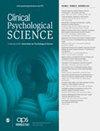Changes in Daily Behaviors and Cognitions During the COVID-19 Pandemic: Associations With Suicide Crisis Syndrome and Suicidal Ideation
IF 4.8
2区 医学
Q1 PSYCHIATRY
引用次数: 0
Abstract
The COVID-19 pandemic resulted in drastic disruptions to lives and possible pernicious impacts on mental health, including suicidality. Understanding these relations, as well as impacts on at-risk populations, is essential. The present study examined changes in daily behaviors and cognitions after the implementation of physical/social distancing mandates in individuals with symptoms of suicide crisis syndrome (SCS) and/or suicidal ideation. Adults (N = 5,528) across 10 countries completed online self-report measures. There were significant main effects of time and various configurations of interactions between time, SCS, and suicidal ideation in predicting behaviors (outdoor and social engagements) and cognitions (thoughts about health, finances, and living situation). Cross-culturally, individuals with more severe SCS symptoms generally had the largest changes in behaviors and cognitions, though this effect was not replicated across all countries. Overall, these findings highlight the implications of the potentially mutually exacerbating influences of routine disruptions and suicide risk and the importance of examining associations cross-culturally.COVID-19大流行期间日常行为和认知的变化:与自杀危机综合征和自杀意念的关系
2019冠状病毒病大流行严重扰乱了人们的生活,并可能对心理健康产生有害影响,包括自杀。了解这些关系以及对高危人群的影响至关重要。本研究考察了具有自杀危机综合征(SCS)症状和/或自杀意念的个体在实施身体/社会距离要求后日常行为和认知的变化。来自10个国家的成年人(5528人)完成了在线自我报告测量。在预测行为(户外和社交活动)和认知(关于健康、财务和生活状况的想法)方面,时间以及时间、SCS和自杀意念之间的各种交互配置具有显著的主要影响。跨文化,SCS症状更严重的个体通常在行为和认知方面的变化最大,尽管这种影响并非在所有国家都能复制。总的来说,这些发现强调了日常中断和自杀风险之间潜在的相互加剧的影响,以及检查跨文化联系的重要性。
本文章由计算机程序翻译,如有差异,请以英文原文为准。
求助全文
约1分钟内获得全文
求助全文
来源期刊

Clinical Psychological Science
Psychology-Clinical Psychology
CiteScore
9.70
自引率
2.10%
发文量
35
期刊介绍:
The Association for Psychological Science’s journal, Clinical Psychological Science, emerges from this confluence to provide readers with the best, most innovative research in clinical psychological science, giving researchers of all stripes a home for their work and a place in which to communicate with a broad audience of both clinical and other scientists.
 求助内容:
求助内容: 应助结果提醒方式:
应助结果提醒方式:


